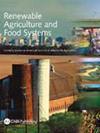选择环保牛肉怎么样?探索意大利消费者的购买意愿
IF 2
3区 农林科学
Q2 AGRICULTURE, MULTIDISCIPLINARY
引用次数: 2
摘要
摘要全球对畜产品的需求不断增加及其对环境的巨大影响,迫切需要制定政策和管理战略。关于肉类消费,可行的行动涉及减少肉类消费,并引导消费者选择更可持续的肉类。这项研究的目的是调查影响肉类消费者购买标签明确表达环保特征的牛肉意向的决定因素。为此,我们假设在牛肉产品上应用生态标签的制度体系。应用基于计划行为理论的扩展框架来理解影响消费者对生态标签牛肉决策过程的因素。对意大利1139名消费者进行了调查。采用验证性因素分析和结构方程模型对数据进行分析。结果表明,牛肉消费者可能会改变他们的习惯,转而选择更可持续的牛肉。分析强调,除了消费者态度、社会规范和感知的行为控制外,机构信任和食品购物习惯在激活消费者对更可持续牛肉的认知决策过程中发挥着重要作用。研究结果增加了关于绿色食品选择决定因素的文献,并为机构信任在购买标有公共标准的牛肉的意图中的作用提供了新的见解。调查结果强调,应特别关注建立对公共机构的信任,以促进可持续的食品消费行为。此外,研究结果验证了先前关于基于信息的政策在促进更可持续的消费选择方面的有效性的研究。本文章由计算机程序翻译,如有差异,请以英文原文为准。
How about choosing environmentally friendly beef? Exploring purchase intentions among Italian consumers
Abstract The increasing global demand for livestock products and its large environmental impact ask for urgent policy and managerial strategies. With regard to meat consumption, feasible actions relate to its reduction and orienting consumers toward more sustainable meat choices. The aim of the study is to investigate the determinants affecting meat consumers in their intention to buy beef whose label clearly expresses environmentally friendly characteristics. To do so, we hypothesized to apply an institutional system of ecological labeling on beef products. An extended framework based on the Theory of Planned Behavior was applied to understand the factors affecting the consumer decision-making process toward eco-labeled beef. A survey was conducted with 1139 consumers in Italy. Data were analyzed by means of confirmatory factor analysis and structural equation models. Results highlight that beef consumers are likely to change their habits, in favor of more sustainable beef choices. The analysis highlights that, together with consumer attitudes, social norms and perceived behavioral control, institutional trust and food shopping habits play an important role in activating the consumer's cognitive decision-making process toward more sustainable beef. Results add to the literature on the determinants of green food-choices and introduce new insights on the role of institutional trust in the intention to buy beef labeled with a public standard. Findings highlight that particular attention should be devoted to build trust for public institutions in order to promote sustainable food consumption behavior. Moreover, results validate previous studies on the effectiveness of information-based policies in fostering more sustainable consumption choices.
求助全文
通过发布文献求助,成功后即可免费获取论文全文。
去求助
来源期刊

Renewable Agriculture and Food Systems
农林科学-农业综合
CiteScore
5.20
自引率
7.40%
发文量
39
审稿时长
>36 weeks
期刊介绍:
Renewable Agriculture and Food Systems (formerly American Journal of Alternative Agriculture) is a multi-disciplinary journal which focuses on the science that underpins economically, environmentally, and socially sustainable approaches to agriculture and food production. The journal publishes original research and review articles on the economic, ecological, and environmental impacts of agriculture; the effective use of renewable resources and biodiversity in agro-ecosystems; and the technological and sociological implications of sustainable food systems. It also contains a discussion forum, which presents lively discussions on new and provocative topics.
 求助内容:
求助内容: 应助结果提醒方式:
应助结果提醒方式:


